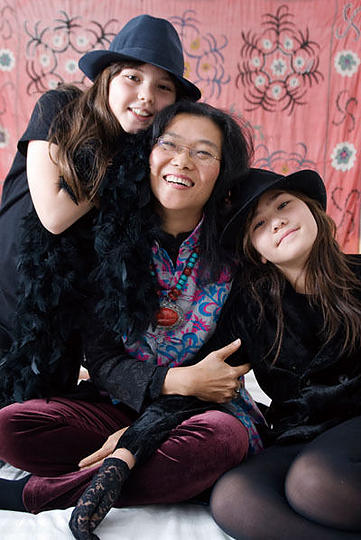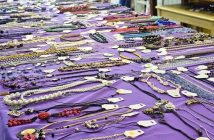How a factory girl became a journalist
 Ask Lijia Zhang about her transformation from factory girl at a missile manufacturer to journalist and author, and she’s likely to reply, “You’ll just have to read my book,” referring to her recently released English-language memoir Socialism is Great. But ask her a few questions about her daughters and Zhang reaches into her purse to dig out photos of her two girls striking poses during a trip to India: May, 11, and Kirsty, 9, half-Chinese, half-English with matching brown hair and doll-like features.
Ask Lijia Zhang about her transformation from factory girl at a missile manufacturer to journalist and author, and she’s likely to reply, “You’ll just have to read my book,” referring to her recently released English-language memoir Socialism is Great. But ask her a few questions about her daughters and Zhang reaches into her purse to dig out photos of her two girls striking poses during a trip to India: May, 11, and Kirsty, 9, half-Chinese, half-English with matching brown hair and doll-like features.
It’s nearly inconceivable that Zhang, who today speaks English with a faint British accent and dresses in colorful clothes, was forced to abandon school at the age of 16 because her mother pushed her to take over her job in a missile factory in Nanjing. Zhang toiled there for the next ten years, but maintained a fierce sensibility within. She staged a demonstration of Nanjing workers in 1989, escaped tedious factory life to live abroad and has since entered the spotlight as a critically acclaimed author whose book was recently reviewed in the New York Times.
After marrying an Englishman – whom she met in a queue for ice cream at the Forbidden City – she moved to Oxford, England, but returned to Beijing three years ago. Zhang isn’t the typical Chinese mother, and her daughters aren’t likely to experience anything like their mother’s struggle – the girls have traveled all over the world with Zhang – but some components of traditional family values still resonate. Zhang explains the concept of tinghua in Chinese culture – when children are obedient. “We go out and people will say, ‘Zheme piaoliang (how pretty!),’ and then they ask, ‘Are they tinghua?’ Well, they’re not really tinghua; they’re very spirited and opinionated,” Zhang says. “Sometimes I wish they were more tinghua and less spirited, but I like the way they are,” she adds with a large laugh.
 Indeed, the girls love the spotlight. May played the lead role in a production of Oliver! this year and Kirsty performs in the International Festival Choir in Beijing. At the slightest mention, they change into black tights, gloves and bowler hats and jump up on their mother’s bed to perform a routine they choreographed a few nights earlier to entertain their mother’s dinner guests. When asked about her mother’s book and fame, May, her eldest, replies in a British accent, “It’s cool. But it’s not like we walk out and people say, ‘It’s Lijia’s children!’ It’s not like she’s J.K. Rowling or anything.”
Indeed, the girls love the spotlight. May played the lead role in a production of Oliver! this year and Kirsty performs in the International Festival Choir in Beijing. At the slightest mention, they change into black tights, gloves and bowler hats and jump up on their mother’s bed to perform a routine they choreographed a few nights earlier to entertain their mother’s dinner guests. When asked about her mother’s book and fame, May, her eldest, replies in a British accent, “It’s cool. But it’s not like we walk out and people say, ‘It’s Lijia’s children!’ It’s not like she’s J.K. Rowling or anything.”
In her book, Zhang describes learning a second language as akin to gaining a second soul. She taught herself English by following a radio program, singing Carpenters songs and reading simplified version of English novels such as Jane Eyre. “When I speak Chinese, I speak louder and faster and not as polished as I pretend I am when I speak English,” says Zhang, who earned a master’s degree in creative and life writing from the University of London in 2004. “When you speak a different language, different sides of your character come out.”
Her daughters, who’ve attended British schools here and in London, both speak English as a first language, but Zhang speaks Mandarin to them and assigns them to write three lines of characters a day, a task she knows does not garner her popularity. “It doesn’t bother me that they consider themselves more British – they went to an English school and they just wanted to fit in,” Zhang says. “I once spoke Mandarin on a bus in London, and they were just so embarrassed.”
Her memoir also includes intimate details of previous love affairs, a fact that hasn’t escaped her children. “May said, ‘But there’s sex and stuff in it! It’s disgusting!’ I guess she heard about it. I said, ‘So what?’” said Zhang. “They’re a bit too young, and I’m not encouraging them to read it right now, since it’s so embarrassing to know about your parents’ sex life, but I’m fine with them reading it.”
Zhang, who has chosen her own path in many ways, remembers her village’s reaction when she married a foreigner. There were rumors that he was going to sell her in the UK, and speculation on her motives for marrying a Westerner. But she says, “It didn’t particularly bother me. That’s when we left China.”
Although interracial marriage still meets with prejudice in some circles, mixed Chinese and Western children are usually received with praise and exclamations of beauty and intelligence, says Zhang. “People say, ‘They don’t look like you.’ Of course they look like me! In different ways, of course, but I see many of my features in them.”
When she first arrived in the UK, Zhang was amazed at the choices children had: “Someone might ask them, ‘How about pasta tonight?’ We should be so grateful just to have food on the table! They are spoiled by choices,” she says. Zhang feels obligated to be more democratic in her decisions, since May and Kirsty are growing up in a more Western environment, but she worries that things come too easily to her daughters.
Looking back on her own much more difficult upbringing, Zhang feels mostly empathy for her mother. She understands that her mother didn’t value education and believed that giving her daughter a job in a factory was the best way to help Zhang. “I understand that we often judge our parents by our standards, and that’s not fair. My mom and I are very different, but I don’t hold any grudge against her,” Zhang says.
As her daughters near adolescence, Zhang finds herself thinking about what she wished she had known when she was 16 and starting her factory job. “I want my girls to fight for something worthwhile. I didn’t have much of a choice when I was 16, but if I had been more assertive – I don’t know, but I didn’t fight enough,” she says.
Like any mother, Chinese or otherwise, Zhang has her own ideas about how her daughters should lead their lives. “Yes, I want them to be journalists. I make them play piano. I encourage them to read. I want them to be fluent in Chinese,” she says.
As Zhang travels across the world to promote her book, she is still struggling with the dissolution of her 15-year marriage. But in typical Zhang fashion, she remains determined and upbeat. “Meeting my husband was the best thing that happened in my life, and I’m not bitter about him or the world. I had a big love, and I always wanted to have children, and I feel lucky.”



